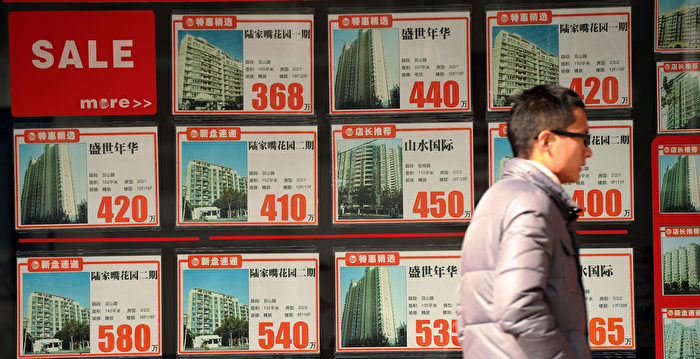[Epoch Times, June 24, 2021](Epoch Times reporter Liu Yi reported) A few days ago, 13 banks in Hefei have stopped lending to second-hand houses, and several other cities have not given clear instructions, but they are also secretly implementing them. This policy. Some people in the industry said that this will have a great impact on the real estate industry, and some believe that this is a manifestation of the exhaustion of the CCP’s “control” measures on the property market.
Radio Free Asia and a number of mainland media quoted the Yangtze Evening News on June 22 as saying that in the WeChat group of some buyers, an intermediary posted a screenshot of the circle of friends, which read: ” Recently, many banks have stopped lending second-hand housing mortgages. From the beginning of the 13 banks in Hefei, they stopped lending. Now many cities such as Suzhou, Chongqing, Wuhan, etc. have not made direct official announcements, and more of them are silently proceeding. “
The article also listed the names of banks that stopped lending, including several large state-owned banks.
The news triggered a heated discussion among buyers in the group. Some people think that this is not the status quo of the property market in Nanjing, so don’t worry too much; more people think that the “action” of financial institutions is a national game of chess. It is unlikely that the same bank will tighten in Shanghai but relax in Nanjing. In their view, close The signal from the release of tight mortgages indicates that the threshold for buying a house will become higher, and it will be more difficult to buy a house just after it is needed.
According to a report by China Business News on June 23, local intermediaries in Hangzhou stated that “some banks have stopped lending to second homes.” Another Hangzhou market person revealed that the Hangzhou branch of the Bank of Nanjing is among the ranks of the second home loan suspension.
The staff of the Hangzhou Construction Bank’s credit department said that they have not received any documents on the suspension of loans for the second home. If you have selected a house, you can speed up the operation process, “because the system is no longer making loans these days.”
In addition to suspending loans and tightening loans, mortgage interest rates are also increasing. According to 365 Taofang’s survey of 20 mainstream banks in Nanjing, 11 banks’ first-home interest rate reached 5.65%, that is, an increase of 100 basis points. Among them, Bank of Communications, Bank of Shanghai, Bank of China, and China Everbright Bank have first-home interest rates. To reach 5.75%, the first home interest rate of Huaxia Bank, Industrial Bank, and Minsheng Bank is about 5.6%, and that of Guangzhou is 5.5%; in terms of interest rates for second homes, the 20 banks generally rate 5.85% to 5.95%, that is, add 120 to 130 basis points. Bank of China and Bank of Hangzhou are as high as 6%, which means an increase of 135 basis points.
In response to this, Ms. Chen from a real estate agency in Nanjing said in an interview with Radio Free Asia on the 23rd that banks are tightening mortgages, which has a great impact on the real estate market: “House prices are already astronomical. If you stop lending, houses will It has really become a real asset, and it is about to fall drastically.”
The commander-in-chief of Chinese financial scholars believes that the Chinese Communist Party’s heavy intervention in housing loans indicates that the means to regulate the real estate market have been exhausted. In the process, private real estate companies have suffered the most: “Many companies have not predicted that the government will use such a large amount of money. The intensity is such a heavy blow to the purchase of second-hand housing. This also makes the market see that as individual consumers, it is difficult to buy a house, and the difference in treatment between state-owned housing enterprises and private housing enterprises is also very prominent.”
Faced with the current situation of the CCP’s suspension of loans, home buyers must either buy the house in full, or the seller will sell the house at a lower price. Buyers and sellers are in a dilemma.
In the face of rising housing prices, the CCP authorities have repeatedly introduced “control” policies on the property market this year. Statistics from the Centaline Real Estate Research Center at the end of May show that the CCP authorities have regulated real estate more than 215 times this year. Especially from April to May. The “control” of real estate continues to be fully upgraded.
However, according to the data released by the National Bureau of Statistics of the Communist Party of China on the changes in the sales prices of commercial housing in 70 large and medium-sized cities in mainland China in May this year, the prices of newly built houses and second-hand houses in these 70 cities are still both year-on-year or month-on-month On the rise.
According to data released by the National Bureau of Statistics of the Communist Party of China, Reuters estimates that the price index of newly built commercial housing in 70 large and medium-sized cities rose by 4.9% year-on-year, and the upward trend continued for 68 months.
The mainland’s property market data shows that housing prices are rising more and more under control.
Editor in charge: Lin Congwen#
.
